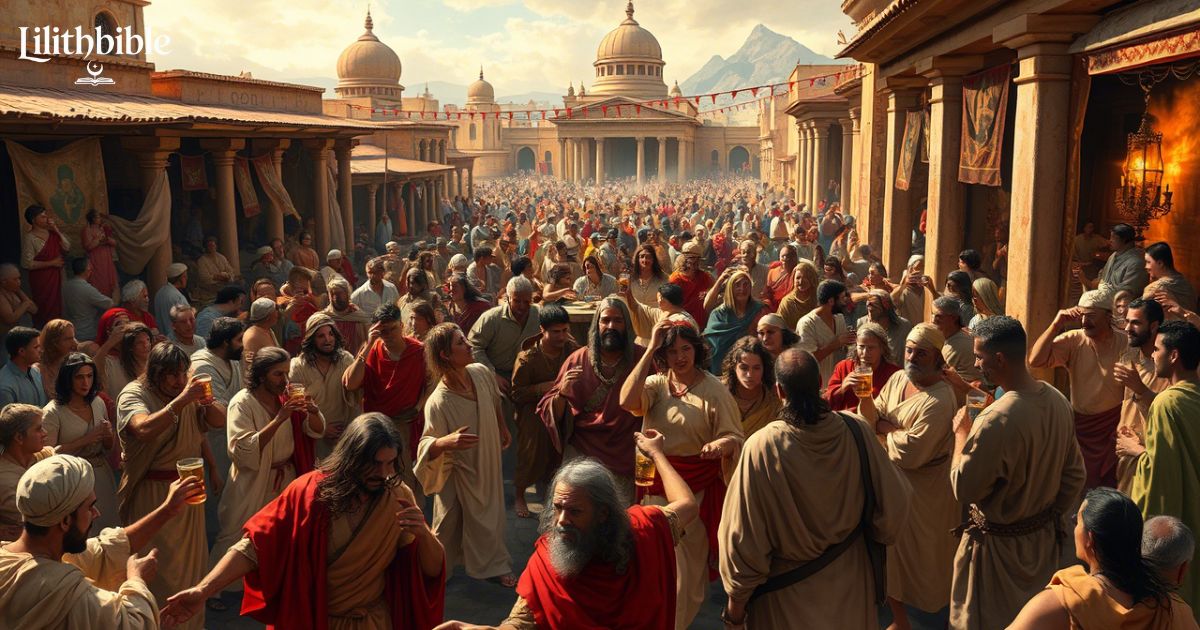Debauchery in Biblical Times was a serious issue. It referred to wild living, sinful pleasures, and lack of self-control. Debauchery meaning in the Bible includes actions that go against God’s will. People in ancient times often gave in to worldly desires. They engaged in immoral behavior, idol worship, and excess drinking. TheDebauchery in Biblical Times warns against these actions. It teaches that such behavior leads to destruction.
What is debauchery in the Bible? It is living without moral limits. The Bible strongly condemns it. Many stories warn about the dangers of sin.Debauchery in Biblical Times led to punishment for individuals and entire cities. Sodom and Gomorrah are famous examples. The scriptures teach self-control, holiness, and faith in God. The debauchery meaning Bible reminds us to avoid sin and seek righteousness. Biblical teachings encourage people to live pure and disciplined lives.
Biblical Meaning of Immorality
In the Bible, immorality refers to behaviors that go against God’s commands and principles. It includes actions like lying, stealing, or committing adultery. Immorality is often seen as the opposite of living a holy life, and it’s something the Bible warns against. It is a serious offense that disrupts the relationship between people and God.
Key Terms
Hebrew Words:
- Nablah: Means “vileness” or “wickedness,” often used to describe actions that are morally corrupt.
- Tameh: Refers to things that are “unclean” or impure, often linked to sin and immorality.
Greek Words:
Porneia: Refers to sexual immorality or fornication, often associated with sinful acts like adultery and prostitution.
Akatharsia: Means “uncleanness” or “impurity,” showing a life filled with immoral acts that defile a person.
Historical Context of Debauchery in the Bible
In biblical times, Debauchery in Biblical Times was seen as a major moral failing, and it often represented a disregard for God’s laws. The Bible highlights how societies indulged in sinful behaviors, particularly when they turned to idolatry and worldly pleasures. This excess was considered not only a personal failure but a societal one that led to moral decay. For instance, the people of Sodom and Gomorrah were known for their debauchery, and the cities were destroyed as a result of their sinful lifestyles (Genesis 19).
Ancient Cultural Practices
In ancient cultures, Debauchery in Biblical Times was often tied to religious rituals and celebrations that involved excessive drinking, sexual immorality, and idol worship. The Golden Calf incident (Exodus 32) shows how the Israelites fell into such practices when they turned away from God, creating a golden idol to worship. This represented a break from God’s commands and an indulgence in the acts of the flesh. These practices were seen as a form of lasciviousness, a term the Bible uses to describe immoral or shameless behavior.
Influence on Early Christian Communities
Early Christian communities faced the challenge of addressing Debauchery in Biblical Times as part of the moral reforms needed to live out the teachings of Jesus Christ and the Apostles. The early Christians were encouraged to reject sinful behaviors and embrace holiness by living according to the Fruit of the Spirit (Galatians 5:19-21). Teachings about repentance, grace, and forgiveness were central to the Christian message, and these concepts helped shape the Christian view of morality.
The Apostles taught that self-control and accountability were essential for living a life that was pleasing to God. They urged believers to avoid being led by their sinful desires, emphasizing the importance of Christian values and the moral guidance found in the Bible. Early Christian writings, such as those from Paul in his letters to the Corinthians and Ephesians, strongly advised against indulging in debauchery, urging believers to focus on spiritual renewal and live in alignment with Christian doctrine.
Old Testament Examples
The Old Testament shows several examples of Debauchery in Biblical Times , focusing on the bad results and important lessons about such behaviors.
Case Studies
- Sodom and Gomorrah:
- These cities were famous for their sinful actions, including debauchery. In Genesis 19, their destruction was God’s judgment against their extreme wickedness.
- The Golden Calf:
- In Exodus 32, the Israelites made and worshiped a golden calf, leading to a day of partying and moral decay. Moses condemned their actions, and there were serious consequences for the people.
Moral Lessons
These stories teach the dangers of ignoring moral values. They warn against too much indulgence in worldly pleasures and turning to idolatry.
New Testament Perspectives
The New Testament provides deeper understanding about debauchery, focusing on the teachings of Jesus Christ and the warnings given by the Apostles.
Teachings of Jesus
Jesus emphasized self-control, inner purity, and the dangers of immorality. In Matthew 5:27-30, He warned against lustful thoughts, explaining that sinful desires lead to sinful behaviors. He also called for repentance and a focus on holiness rather than worldly pleasures.
Apostolic Warnings
The Apostles frequently spoke against debauchery and excessive indulgence. In Galatians 5:19-21, Paul listed acts of the flesh, including lasciviousness, as behaviors that separate people from God. In 2 Peter 2:13, Peter warned that those who live in sensual pleasures and sinful indulgence will face judgment. The Apostles encouraged believers to live by the Fruit of the Spirit and follow Christian values.
Moral Implications of Debauchery
The Bible teaches that debauchery leads to moral decay, affecting both individuals and society. It warns against excessive indulgence, sensual pleasures, and immorality, urging believers to practice self-control and live by Christian values.
Consequences for Individuals
A person who indulges in debauchery may experience spiritual, emotional, and even physical consequences:
- Spiritual Separation: The Bible teaches that sinful behaviors create a divide between individuals and God (Galatians 5:19-21).
- Loss of Self-Control: Akrasia (lack of self-control) leads to poor decision-making and an inability to resist sinful temptations.
- Moral and Emotional Decline: Living in excessive indulgence often results in guilt, shame, and a weakened sense of personal accountability.
Effects on Society
When debauchery becomes widespread, it negatively impacts communities and cultures:
- Moral Decline: Societies that embrace idolatry, lasciviousness, and immorality often experience a breakdown of ethical standards.
- Social Injustice: Systemic moral failings, such as greed and corruption, increase when people prioritize worldly pleasures over moral responsibility.
- Spiritual Decline: The Bible highlights how cities like Sodom and Gomorrah and events like the Golden Calf (Exodus 32) led to divine judgment due to widespread wickedness.
By promoting holiness, repentance, and Christian doctrine, individuals and societies can overcome the destructive effects of debauchery and embrace a life of spiritual renewal.
Debauchery and Christian Teachings
Christianity strongly warns against debauchery, emphasizing moral responsibility, self-control, and the pursuit of holiness. The Bible encourages believers to avoid sinful behaviors and instead follow the path of grace and forgiveness through Jesus Christ.
Core Christian Doctrines
- Sin and Redemption: The Bible teaches that debauchery is part of the acts of the flesh (Galatians 5:19-21) but that repentance leads to grace and forgiveness (Ephesians 2:8-9).
- Free Will and Moral Responsibility: Christianity emphasizes that humans have the free will to choose between worldly pleasures and Christian values.
- Fruit of the Spirit: In contrast to debauchery, believers are called to cultivate virtues such as self-control, holiness, and ethical behavior.
Theological Interpretations
Different Christian traditions have interpreted debauchery in various ways:
- Early Church Writings: The Apostles warned that excessive indulgence led to spiritual decay and urged believers to seek spiritual renewal (2 Peter 2:13).
- Reformation Perspectives: Reformers like Martin Luther and John Calvin emphasized avoiding immorality and living in accordance with Biblical teachings.
- Modern Christian Views: Today, revival movements and faith-based communities stress the importance of self-reflection, personal accountability, and avoiding the temptations of worldly pleasures.
By understanding Christian doctrine and applying moral guidance, believers can resist debauchery and live a life aligned with Biblical teachings.
Sin and Redemption

The Bible teaches that sin separates humans from God, but through redemption, believers can receive grace and forgiveness. Debauchery, as an example of sinful behaviors, is warned against in Scripture, yet God offers a path to redemption for those who repent.
Concept of Sin
- Biblical Definition: Sin is any action, thought, or behavior that goes against God’s commandments and leads to moral decay (Galatians 5:19-21).
- Debauchery as Sin: Acts of the flesh, including lasciviousness, idolatry, and excessive indulgence, are considered sinful in the Christian doctrine.
- Consequences of Sin: The Bible warns that those who practice debauchery without repentance face spiritual separation from God (2 Peter 2:13).
Path to Redemption
- Repentance and Grace: The Bible teaches that repentance leads to grace and forgiveness (Ephesians 2:8-9). Even those who have lived in sinful indulgence can receive salvation through faith in Jesus Christ.
- Spiritual Renewal: Accepting Christ leads to self-reflection, a rejection of worldly pleasures, and a commitment to Christian values.
- Living by the Fruit of the Spirit: Believers are called to replace sinful behaviors with qualities like self-control, holiness, and personal accountability.
The Bible emphasizes that redemption is available to all who seek it, highlighting the importance of moral guidance, ethical behavior, and faith in Jesus Christ.
Free Will and Debauchery
The Bible teaches that free will is a gift from God, allowing individuals to choose between holiness and sinful behaviors. However, with this freedom comes the responsibility to avoid debauchery, immorality, and excessive indulgence.
Role of Free Will
- A Gift from God: Humans are not forced to follow Christian values but are given the free will to make moral choices.
- Temptation and Choice: The Bible warns that while people can pursue worldly pleasures, they must also recognize the spiritual consequences (Galatians 5:19-21).
- Biblical Teachings on Self-Control: The Apostle Paul emphasized resisting acts of the flesh and instead choosing ethical behavior and self-control.
Moral Responsibility
- Personal Accountability: Every individual is responsible for their actions and the consequences of embracing lasciviousness, idolatry, or immorality.
- Repentance and Redemption: While free will allows people to fall into sin, the Bible also teaches that grace and forgiveness are available through repentance (Ephesians 2:8-9).
- Living by the Fruit of the Spirit: Instead of indulging in debauchery, Christians are encouraged to embrace holiness, self-reflection, and spiritual renewal.
The balance between free will and moral responsibility is a key theme in Christian doctrine, reminding believers that their choices shape both their spiritual path and their relationship with God.
Modern Application of Biblical Debauchery
In today’s world, debauchery is often associated with excessive indulgence, sensual pleasures, and moral decay. The Bible’s teachings on self-control, personal accountability, and holiness remain relevant, guiding believers in resisting worldly pleasures and living according to Christian values.
Church Teachings
- Moral Guidance: Many churches emphasize avoiding sinful behaviors such as lasciviousness, idolatry, and immorality, which are described in Galatians 5:19-21.
- Social Justice and Ethical Living: Modern Christian communities stress the importance of social justice, ethical behavior, and standing against systemic moral failings.
- Spiritual Renewal: Many revival movements encourage believers to reject acts of the flesh and embrace a life of repentance and grace and forgiveness (Ephesians 2:8-9).
Personal Conduct
- Self-Reflection and Accountability: Christians are encouraged to examine their lives, avoid excessive indulgence, and practice self-control.
- Living by Biblical Teachings: Instead of pursuing hedonism, believers are called to live by the Fruit of the Spirit, fostering holiness, moral responsibility, and ethical behavior.
- Faith in Everyday Life: Avoiding debauchery involves making wise choices in relationships, entertainment, and lifestyle while staying committed to Christian doctrine.
By applying Biblical teachings to modern life, believers can resist moral decay, uphold Christian values, and strive for spiritual renewal in a world filled with temptations.
Comparative Analysis
The concept of Debauchery in Biblical Times is interpreted differently across various Bible translations and cultural contexts. While the core meaning remains consistent—referring to excessive indulgence and immorality the wording and emphasis can vary, shaping how readers understand sin and redemption.
Debauchery in Different Biblical Translations
- King James Version (KJV): Uses terms like lasciviousness and riotous living to describe debauchery, emphasizing its connection to sinful behaviors (Galatians 5:19-21).
- New International Version (NIV): Translates debauchery as “wild living” or “reckless indulgence”, making it more relatable to modern readers.
- The Message (Bible Translation): Uses contemporary language to describe moral decay, linking debauchery to lack of self-control, hedonism, and worldly pleasures.
Cultural Views on Debauchery
- Ancient Biblical Societies: Debauchery was often associated with idolatry, as seen in Exodus 32 with the worship of the Golden Calf, and in Genesis 19 with the destruction of Sodom and Gomorrah.
- Early Christian Communities: The Apostles warned against excessive indulgence and promoted moral responsibility to combat spiritual decline (2 Peter 2:13).
- Modern Society: Some cultures accept sensual pleasures and hedonism as personal choices, while others, particularly Christian communities, emphasize self-control, personal accountability, and Christian values.
Key Takeaways
The Bible consistently warns against debauchery, regardless of translation or cultural context. However, different theological perspectives influence how societies interpret and apply these teachings. Whether in ancient times or today, moral guidance, repentance, and spiritual renewal remain central themes in addressing excessive indulgence and immorality.
Reformation and Revival Movements
Throughout history,Debauchery in Biblical Times has responded to moral decay and sinful behaviors through Reformation and revival movements. These movements sought to restore holiness, promote self-control, and encourage repentance among believers.
Historical Reactions
- The Protestant Reformation (16th Century): Led by Martin Luther, this movement challenged systemic moral failings within the Church, emphasizing grace and forgiveness (Ephesians 2:8-9) and the rejection of worldly pleasures and idolatry.
- The Great Awakenings (18th-19th Century): These revival movements in America and Europe called for personal accountability, spiritual renewal, and a return to Biblical teachings. They strongly condemned excessive indulgence and acts of the flesh.
- The Holiness Movement (19th-20th Century): Focused on Christian values, this movement promoted moral responsibility and rejected debauchery, emphasizing the pursuit of holiness.
Contemporary Movements
- Evangelical Revival: Many modern churches emphasize moral guidance, warning against hedonism, lasciviousness, and immorality while promoting self-reflection and ethical behavior.
- Social Justice and Faith: Some Christian groups address systemic moral failings by integrating Christian doctrine with efforts to combat moral decay and sinful behaviors in society.
- Pentecostal and Charismatic Movements: These movements highlight spiritual renewal, urging believers to resist debauchery and embrace the Fruit of the Spirit as outlined in Galatians 5:19-21.
Key Takeaways
Both historical and modern revival movements emphasize resistingDebauchery in Biblical Times , fostering personal accountability, and living by Christian teachings. Whether through Reformation or contemporary faith-based communities, the goal remains the same: turning away from excessive indulgence and embracing a life of faith, holiness, and moral responsibility.
FAQs
What are examples of debauchery in the Bible?
Debauchery in Biblical Times includes drunkenness, sexual immorality, and idol worship. Sodom and Gomorrah were destroyed because of their sinful and wicked ways.
Where in the Bible does it mention debauchery?
The Bible warns against debauchery in Biblical Times in verses like Galatians 5:19-21 and Ephesians 5:18. It teaches self-control and turning away from sinful desires.
What is the most sinful act in the Bible?
The Bible considers rejecting God as the worst sin. Debauchery in Biblical Times led to destruction because it turned people away from righteousness and faith.
What is the act of debauchery?
Debauchery in Biblical Times means reckless living, drunkenness, and lust. It is indulging in sinful pleasures, ignoring God’s teachings, and living without self-control or morality.
Why does the Bible warn against debauchery?
Debauchery in Biblical Times led to punishment and suffering. The Bible teaches that sinful living destroys the soul, while righteousness brings peace, joy, and eternal life.
Conclusion
Debauchery in Biblical Times was seen as sinful and led to severe consequences. The debauchery meaning in the Bible refers to immoral behavior that goes against God’s laws. Many stories warn against indulgence, showing how societies fell due to wickedness. The Debauchery in Biblical Times presents it as actions driven by lust, greed, and excess. These behaviors led to punishment, teaching people to live with righteousness. What is debauchery in the Bible? It is a warning about how sinful acts destroy spiritual lives.
TheDebauchery in Biblical Times reminds us that uncontrolled desires lead to destruction. The debauchery in the Bible was often linked to idol worship, drunkenness, and sinful pleasures. God’s judgment fell upon those who ignored His teachings. These stories encourage moral living and obedience. Today, these lessons remain relevant, urging people to avoid sin. Debauchery in Biblical Times teaches the importance of self-control and faith in God’s word.

Dayo Olu is the experienced admin of LilithBible, a blogging website. With 5 years of strong blogging and content management experience, Dayo supports the platform from Nigeria with great care and dedication.








